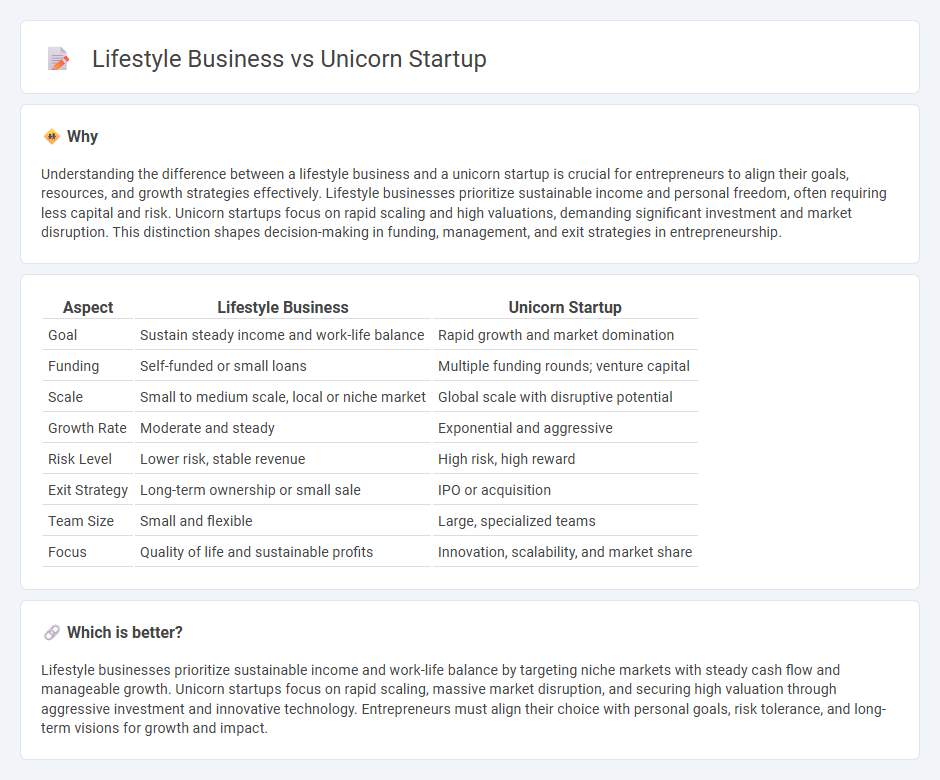
Lifestyle businesses focus on sustaining a steady income while maintaining personal freedom and work-life balance, often prioritizing passion over rapid growth. Unicorn startups aim for exponential growth and massive market disruption, attracting significant venture capital to achieve billion-dollar valuations. Explore the key differences and strategic approaches between these two entrepreneurial paths.
Why it is important
Understanding the difference between a lifestyle business and a unicorn startup is crucial for entrepreneurs to align their goals, resources, and growth strategies effectively. Lifestyle businesses prioritize sustainable income and personal freedom, often requiring less capital and risk. Unicorn startups focus on rapid scaling and high valuations, demanding significant investment and market disruption. This distinction shapes decision-making in funding, management, and exit strategies in entrepreneurship.
Comparison Table
| Aspect | Lifestyle Business | Unicorn Startup |
|---|---|---|
| Goal | Sustain steady income and work-life balance | Rapid growth and market domination |
| Funding | Self-funded or small loans | Multiple funding rounds; venture capital |
| Scale | Small to medium scale, local or niche market | Global scale with disruptive potential |
| Growth Rate | Moderate and steady | Exponential and aggressive |
| Risk Level | Lower risk, stable revenue | High risk, high reward |
| Exit Strategy | Long-term ownership or small sale | IPO or acquisition |
| Team Size | Small and flexible | Large, specialized teams |
| Focus | Quality of life and sustainable profits | Innovation, scalability, and market share |
Which is better?
Lifestyle businesses prioritize sustainable income and work-life balance by targeting niche markets with steady cash flow and manageable growth. Unicorn startups focus on rapid scaling, massive market disruption, and securing high valuation through aggressive investment and innovative technology. Entrepreneurs must align their choice with personal goals, risk tolerance, and long-term visions for growth and impact.
Connection
Lifestyle businesses focus on sustaining a steady income and work-life balance, often prioritizing personal goals over rapid growth. Unicorn startups pursue exponential growth and high valuation, aiming to disrupt markets and attract significant venture capital funding. Both represent ends of the entrepreneurship spectrum, with lifestyle businesses providing stability and unicorns driving innovation and economic impact.
Key Terms
Scalability
Unicorn startups prioritize rapid scalability through aggressive market expansion and massive funding rounds, aiming for exponential revenue growth and high valuation within a short timeframe. Lifestyle businesses focus on sustainable, steady growth with controlled scalability that supports the owner's desired work-life balance without seeking external investment. Explore more about scalability strategies to determine the best business model for your goals.
Valuation
Unicorn startups achieve valuations exceeding $1 billion by emphasizing rapid growth, large market capture, and significant venture capital investments. Lifestyle businesses focus on steady revenue streams, sustainable profit margins, and personal owner control, often valuing stability over aggressive expansion. Explore the differences in valuation strategies to determine the best fit for your entrepreneurial goals.
Founder Goals
Unicorn startups aim for rapid growth and billion-dollar valuations, reflecting founders' goals for high-scale impact and significant financial returns. Lifestyle businesses prioritize sustainable income and work-life balance, aligning with founders' desires for autonomy and steady revenue without aggressive expansion. Explore how founder goals shape business strategies and outcomes to make informed decisions.
Source and External Links
How to become a unicorn startup in 2024 - A unicorn startup is a privately held company valued at $1 billion or more, with only around 1,200 worldwide as of 2024, and becoming one typically takes about six years involving steps like developing a minimum viable product, securing funding, scaling, and planning an exit strategy.
Unicorn Companies 2025: Global List, Stats & Valuation ... - Unicorn companies are privately held startups valued over $1 billion, known for innovative business models, hypergrowth, strong market positioning, and significant venture capital backing, with total unicorn valuations reaching over $5.9 trillion by 2025.
Unicorn (finance) - A unicorn is a privately owned startup valued at over $1 billion, often achieving rapid growth through strategies like blitzscaling, and many reach unicorn status either organically or via buyouts by major public companies.
 dowidth.com
dowidth.com